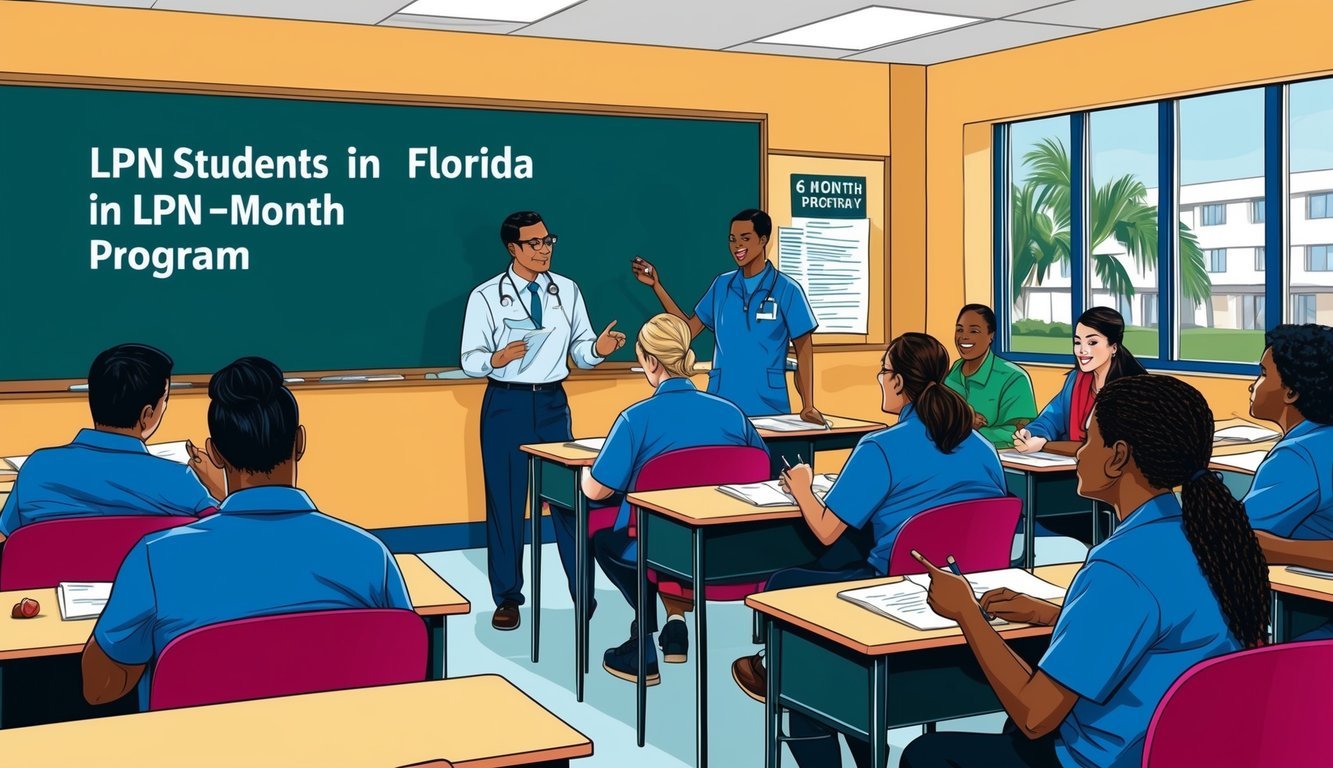If you’re considering a career in nursing, 6-month LPN programs in Florida offer a quick route to becoming a licensed practical nurse.
These fast-track options allow you to gain essential skills and knowledge needed in the healthcare field without spending years in school.
Many programs combine online coursework with hands-on training, making it easier for you to balance your studies with other responsibilities.
These programs are designed for individuals who want to jumpstart their nursing careers.
You’ll cover important subjects like anatomy, pharmacology, and patient care.
Admission requirements typically focus on having a high school diploma or equivalent, making it accessible for many aspiring nurses looking for an accelerated path.
As you consider these options, it’s important to know how they can set you up for future success.
Completing an LPN program can lead to various career opportunities in hospitals, clinics, and long-term care facilities, ensuring a rewarding job in the healthcare industry.
Key Takeaways
- 6-month LPN programs provide a quick path to nursing certification.
- Admission is often straightforward, requiring basic educational credentials.
- Graduates can expect diverse job opportunities in the healthcare sector.
Overview of LPN Programs in Florida
LPN programs in Florida offer a practical pathway for individuals seeking to enter the nursing field.
These programs are essential for meeting the state’s healthcare needs and provide students with the training required to become licensed practical nurses.
Accreditation and State Approval
To ensure the quality of your education, it’s crucial that the practical nursing program you choose is accredited.
Accreditation means that the program meets established standards.
In Florida, the Florida Board of Nursing oversees the approval of these programs.
Here are key points to consider:
| Accrediting Body | Purpose |
|---|---|
| Florida Board of Nursing | Approves programs and ensures quality |
| ACEN (Accreditation Commission for Education in Nursing) | Provides accreditation for nursing education |
Before enrolling, verify that the program is recognized by these bodies.
This approval is vital for your eligibility to take the NCLEX-PN exam and obtain your nursing license.
Scope of Practical Nursing
As a licensed practical nurse (LPN), you will perform a wide range of duties under the supervision of registered nurses and physicians.
Your responsibilities often include:
- Administering medications
- Monitoring patient health
- Assisting with daily living activities
- Collecting patient information
Understanding the scope of your practice is essential for success.
Florida law outlines specific tasks that you are allowed to perform as part of your role.
Familiarize yourself with these regulations to ensure compliance and effective patient care.
By completing an accredited program, you will be equipped with the skills necessary to thrive in various healthcare settings.
Curriculum and Coursework

The curriculum of six-month LPN programs in Florida is designed to provide you with essential nursing knowledge and skills.
It combines theoretical concepts with practical training to prepare you for a career in nursing.
The coursework includes core nursing classes along with specialized training and clinical experiences that are crucial for your development.
Core Nursing Courses
In your core nursing courses, you will study subjects that form the foundation of nursing practice.
Key topics include:
- Anatomy and Physiology: Understanding the human body and its systems.
- Nursing Theory: Learning the principles underlying nursing practices.
- Pharmacology: Gaining knowledge about medications and their effects.
These courses are typically organized into lectures, discussions, and assessments to help you grasp complex concepts.
Assignments may involve case studies that require critical thinking and application of what you’ve learned in real-life scenarios.
Specialized Training and Clinical Practices
Specialized training and clinical practice are integral parts of your education.
You will gain hands-on experience in various healthcare settings, which enhances your learning.
During clinical rotations, expect to:
- Provide nursing care to patients under supervision.
- Participate in activities that focus on patient assessment and care planning.
- Work directly with healthcare professionals, which helps you understand the team dynamics in a clinical setting.
This training often includes simulations and group exercises that prepare you for real-world challenges in nursing.
By completing these experiences, you will build confidence and competence in your nursing abilities, making you well-equipped for your future career.
Admission Requirements and Enrollment Process

Understanding the admission requirements and the enrollment process is essential for entering a 6-month LPN program in Florida.
These factors determine your eligibility and provide a clear pathway to join this rewarding field.
Eligibility Criteria
To apply for a 6-month LPN program, you must meet specific eligibility criteria.
Common requirements include:
- Age: You must be at least 18 years old.
- Education: A high school diploma or GED is necessary.
- Background Check: You may need to pass a criminal background check.
- Health Requirements: Many programs require a physical exam, immunizations, and a drug screening.
Some schools may have additional criteria, such as minimum GPA or prerequisite courses.
Review the specific requirements of your chosen nursing school for accuracy.
Resources like Nursing Process can provide helpful insights into various programs.
Application Procedures
The application process for a 6-month LPN program involves several steps:
- Research Programs: Identify schools that offer 6-month LPN programs that suit your needs.
- Gather Documentation: Prepare necessary documents, including transcripts and proof of health requirements.
- Complete the Application: Fill out the application form for your preferred nursing school.
- Financial Aid: Look into options for financial assistance if needed.
After submitting your application, it’s advisable to contact the school for updates.
Some institutions provide academic advising and student support services to help you navigate this process smoothly.
For detailed program information, visit EduMed for guidance.
Online and Hybrid Program Options

Many LPN programs in Florida offer both online and hybrid options.
These formats are designed to fit the needs of students who may have work or family commitments.
Here’s a closer look at each type.
Remote Learning Platforms
Online LPN programs utilize various remote learning platforms that allow you to access courses from anywhere.
You will engage with materials through video lectures, discussions, and assignments.
Typically, these platforms include features such as:
- Interactive lectures: These keep you engaged and help deepen your understanding.
- Discussion forums: You can ask questions and interact with peers and instructors.
- Virtual labs: These simulate clinical situations and help build your practical skills.
Many programs also provide resources for technical support and academic advising to ensure you succeed.
Combining flexibility with comprehensive training helps you prepare for your LPN career effectively.
For more details, check out offerings from EduMed and EveryNurse.
Hybrid Program Structure
Hybrid LPN programs blend online coursework with in-person training.
This approach gives you the chance to gain hands-on experience while also benefiting from the convenience of online classes.
Key elements include:
- Online Classes: Most theory classes are completed online, allowing for a self-paced study.
- In-Person Labs: You will attend specific sessions to practice skills in a supervised environment, crucial for developing your clinical abilities.
This structure helps you balance your studies with personal commitments.
Each program will have its own schedule, so reviewing specifics is essential.
Many students prefer this model for the balance it offers.
For more on hybrid programs, check out options listed by Nursing Process.
Career Pathways After LPN Certification
After obtaining your LPN certification, you have various pathways to enhance your nursing career.
You can choose to advance your education by transitioning to a Registered Nurse (RN) position or explore specialized fields within nursing.
Both options can significantly expand your professional opportunities.
Transition to Registered Nurse (RN)
Transitioning from an LPN to an RN is a popular choice.
This path typically involves completing an LPN-to-RN bridge program.
These programs are designed for Licensed Practical Nurses and usually take about one year to complete.
To become an RN, you will need to pass the NCLEX-RN exam.
The pass rate for first-time test takers in Florida is generally around 90%.
This high rate indicates strong preparation from LPN-to-RN programs.
After completing the RN program, your career options increase.
As an RN, you can work in hospitals, clinics, and various healthcare settings.
RNs often have more responsibilities and can provide a wider range of patient care.
Continuing Education and Specializations
Continuing education is crucial for LPNs seeking to advance their careers.
You can pursue specializations in areas like pediatrics, geriatrics, or critical care.
Many organizations offer certification programs to enhance your skills in these areas.
Some LPNs choose to take courses in subjects such as pharmacology or patient management.
These specialized courses improve your qualifications and can lead to higher-paying roles.
Additionally, attending workshops and seminars can keep your knowledge up-to-date with the latest healthcare practices.
Networking with professionals in specialized fields can also open new career opportunities.
By focusing on education and specialization, you position yourself for greater career advancement in nursing.
Frequently Asked Questions

There are several important aspects to understand about 6-month LPN programs in Florida.
This section covers enrollment requirements, accreditation, costs, online formats, average salaries, and specific programs available in Orlando.
What are the requirements to enroll in a fast-track LPN program in Florida?
To enroll in a fast-track LPN program in Florida, you typically need to meet certain criteria.
- Age: You must be at least 18 years old.
- Education: A high school diploma or GED is required.
- Background Check: Most programs require a criminal background check.
- Health Requirements: You may need to provide proof of vaccinations and pass a physical exam.
What are the accreditation standards for 6-month LPN programs in Florida?
Accreditation is crucial for LPN programs.
- State Approval: Programs must be approved by the Florida Board of Nursing.
- National Accreditation: Look for programs accredited by organizations like the Accrediting Bureau of Health Education Schools (ABHES) or the Commission on Collegiate Nursing Education (CCNE).
How do the costs compare among accelerated LPN programs in the state of Florida?
Costs for LPN programs can vary widely.
| Program Type | Average Cost Range |
|---|---|
| Campus-Based LPN | $10,000 – $20,000 |
| Online LPN | $8,000 – $15,000 |
Many institutions offer financial aid options, such as grants and scholarships, to help manage these expenses.
Is it possible to complete an LPN program online in Florida, and how do these programs work?
Yes, online LPN programs are available in Florida.
- Structure: These programs usually combine online coursework with clinical requirements in local healthcare facilities.
- Flexibility: You can often study at your own pace, making it easier to balance work and personal commitments.
What is the average hourly salary for LPNs in Florida upon program completion?
Upon completing an LPN program in Florida, you can expect competitive salaries.
- Average Hourly Wage: Approximately $22 to $25 per hour.
- Annual Salary: This translates to an annual income ranging from $45,760 to $52,000. The income depends on experience and location.
Are there any LPN programs in Orlando that can be completed in 6 months, and what are their specifics?
Yes, you can find several LPN programs in Orlando that you can complete within six months.
These programs usually offer an intensive curriculum, which includes accelerated classes covering essential nursing topics.
Additionally, you’ll also get hands-on training, allowing you to gain practical experience in local healthcare facilities.
For more specific information about programs, you can explore options through local colleges or visit EduMed.

